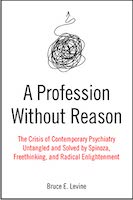Has Big Pharma Corruption Suppressed Effective Treatment Options?
Establishment psychiatry is under attack in Congress. Investigators are recognizing that not all mental health treatments come in a pill.
American psychiatry has been rocked by Congress. Congressional investigators first exposed the financial relationships between high-profile psychiatrists and drug companies. “But now the profession itself is under attack in Congress,” reported the New York Times on July 12, 2008.
The Science of Happiness: Is It All Bullshit?
Just because a Harvard academic says something is so, doesn’t mean it is.
A “Daily Show” interview that hit a chord for me was Jon Stewart’s conversation with Tal Ben-Shahar, who teaches “positive psychology” at Harvard and has written a self-help book. Early in the interview, a suspicious Stewart declares, “I am a psychology major, so I know a lot of it is bullshit.”
Exposed: Harvard Shrink Gets Rich Labeling Kids Bipolar
Meet the man who got rich by popularizing bipolar disorder for children. Congressional investigators and the NY Times expose the scandal.
What Dick Cheney is to the U.S. invasion of Iraq, psychiatrist Joseph Biederman is to the explosion of psychiatric medications in American children. Recently, Biederman was nailed by congressional investigators and the New York Times for overestimating just how greedy an elite shrink is entitled to be. Beyond a peek into the corruption of psychiatry at its highest levels, the scandal is an opportunity to reconsider the Big Pharma financed view of why kids become disruptive and destructive.
Are Antidepressants Faith-Based Treatment?
Bias in drug studies may mask the mind’s role in overcoming depression.
While millions of people swear by Prozac, Zoloft, and other antidepressants, do they work any better than a placebo or no treatment at all?
How Teenage Rebellion Has Become a Mental Illness
Big pharma has some new customers. Not complying with authority is now, in many cases, labeled a disease.
For a generation now, disruptive young Americans who rebel against authority figures have been increasingly diagnosed with mental illnesses and medicated with psychiatric (psychotropic) drugs.
America’s Love-Hate Relationship With Drugs
Many prescription drugs have effects similar to those of illegal drugs. But we still view some users as criminals – the others as patients.
While Americans are inundated with coverage of the Democrats’ quibbling over Barack Obama’s use of marijuana and cocaine as a teenager, a truly important drug story continues to be neglected: The hypocrisy of Big Pharma, psychiatry officialdom, and justice institutions regarding mood-altering (psychotropic) drugs – specifically the denial of the similarity between illegal and psychiatric drugs.
A Blue Ohio: Democrats and the Blue-Collar Blues
I have been a clinical psychologist in private practice for more than two decades in southwestern Ohio, a Republican stronghold in the state that broke Democrats’ hearts in 2004. Three years later, it appears that most of the “blue team” remembers Ohio only for voter fraud, but I remember how Democratic candidate John Kerry failed […]
Why I Don’t “Disease” Depression
If forced to choose between labeling immobilizing depression as either a character weakness or a disease, it’s understandable that disease would be the preference. But there is a third choice, one that normalizes depression and which — for people such as myself — feels more respectful and better reduces suffering. I regularly do battle with […]
Is Our Worship of Consumerism and Technology Making Us Depressed?
It would be a lot easier to address the increasing rate of depression among Americans if we weren’t so afraid to admit that our consumer society makes us unhappy.
The following is an excerpt from Surviving America’s Depression Epidemic: How to Find Morale, Energy, and Community in a World Gone Crazy (Chelsea Green, 2007) by Bruce E. Levine, and is reprinted here with permission from the publisher. In this book, Levine delves into the roots of depression and links our increasingly consumer-based culture and standard-practice psychiatric treatments to worsening depression, instead of solving it.




